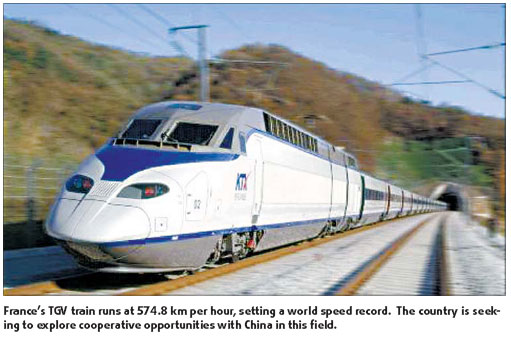Trade upswing unabated

The Airbus A380 super-jumbo recently embarked on a weeklong demonstration tour in China, from Guangzhou to Shanghai and Beijing.
The 519-seat, double-deck aircraft was last in China in November 2006, but this time 300 guest passengers were invited aboard for the hour-long flight.
The first Chinese buyer of the A380, China Southern Airlines had ordered five aircraft, but delays in manufacture have dashed the carrier's plans to fly the super-jumbos during the 2008 Beijing Olympics. Their earliest operation in China is expected to be in 2009.
The Airbus story received widespread media coverage each time the aircraft arrived but the deal reflects only a tiny part of China's economic relations with France.
Trade between China and France increased from 9 billion euros ($13.27 billion) to 32 billion euros ($47.16 billion) over the past decade.
French business people and officials generally agree that China's rapid economic rise has had a positive impact on bilateral economic relations and it has even stimulated the French economy.
Bilateral trade volume reached $23.79 billion in the first three quarters of this year, an annual surge of 34.1 percent year-on-year.
China is the eighth largest trading partner of France, ahead of Switzerland and Japan.
Last year, French exports to China touched a new high at about 8.1 billion euros ($11 billion), up 39.25 percent, a nearly fourfold growth rate, compared to the previous year.
"France is keen on developing strong and confident relations with China," said Hubert Testard, a minister at the French Embassy in Beijing.
And China's rapid economic rise has had a positive impact on bilateral economic relations and it has even added stimulus to the French economy, he added.
The growing export market is supported mainly by such industries as aeronautics, automobile and railway transportation, agro-food and consumer goods, mechanical and electrical machinery.
France has a trade deficit with China. But from a more global viewpoint, French investors in China are contributing a lot to boosting bilateral growth, as some of them export their goods made in China back to their homeland.
According to a French Embassy survey, the country's collective turnover in China was more than 14 billion euros ($19.04 billion) in 2005, far higher than direct exports and increasing 25 percent on average every year.
These companies have more than 250,000 Chinese employees. The development of their presence in China is strategically essential for several reasons, said Testard.
Firstly, foreign companies need to be in China to forge closer relations with local customers, with competitive prices and improved services.
Secondly, China is also seen as a key manufacturing base and an export portal to enter markets across Asia.
Thirdly, sourcing from Chinese subcontractors is increasingly becoming a necessity in order to improve the global cost structure of many French products.
Smaller enterprises, in particular, are coming to China in growing numbers.
Seventy-five percent of CCFIC member companies have fewer than 250 employees.
In 2006, 100 new members with fewer than 250 employees joined the chamber.
Meanwhile, Chinese businesses have also increased their presence in the European country in recent years.
Most of the Chinese businesses operating in France so far may be small, but they cover diverse sectors, ranging from chemicals and textiles to electronics and household electronic equipment.
According to data from the French side, most of the Chinese companies that have established presence in France regards the European country as a key portal for their strategic plans.
Some of them have made Paris their headquarters for expansion in Europe and even Africa.
Since last year, Chinese financial institutions such as the Export-Import Bank of China have also begun to set up office in France.
(China Daily 11/26/2007 page14)














